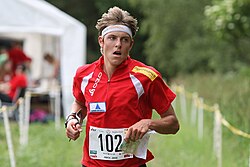| Year | Hosting nations | Notes |
|---|
| 1986 |  Norway, Norway,  Canada, Canada,  United States, United States,  France, France,  Sweden, Sweden,  Czechoslovakia, Czechoslovakia,  Hungary, Hungary,  Switzerland Switzerland | 8 events |
| 1988 |  Hong Kong, Hong Kong,  Australia, Australia,  Great Britain, Great Britain,  Finland, Finland,  Czechoslovakia, Czechoslovakia,  Hungary, Hungary,  Sweden Sweden | 8 events |
| 1990 |  Poland, Poland,  Denmark, Denmark,  Norway, Norway,  Canada, Canada,  United States, United States,  Switzerland, Switzerland,  France, France,  Germany Germany | 8 events |
| 1992 |  Sweden, Sweden,  Finland, Finland,  Russia, Russia,  Hungary, Hungary,  Austria, Austria,  Italy, Italy,  Canada, Canada,  United States United States | 8 events |
| 1994 |  New Zealand, New Zealand,  Australia, Australia,  Norway, Norway,  Denmark, Denmark,  Germany, Germany,  Czech Republic Czech Republic | 9 events (6 individual, 3 relays) |
| 1996 |  Lithuania, Lithuania,  Latvia, Latvia,  Sweden, Sweden,  Norway, Norway,  Switzerland, Switzerland,  France France | 10 events (7 individual, 3 relays) |
| 1998 |  Ireland, Ireland,  Great Britain, Great Britain,  Sweden, Sweden,  Poland, Poland,  Slovakia, Slovakia,  Estonia, Estonia,  Finland Finland | 13 events (10 individual, 3 relays). |
| 2000 |  Japan, Japan,  Australia, Australia,  Ukraine, Ukraine,  Finland, Finland,  Portugal Portugal | 12 events (9 individual, 3 relays) |
| 2002 |  Belgium, Belgium,  Switzerland, Switzerland,  Norway, Norway,  Sweden, Sweden,  Hungary, Hungary,  Czech Republic Czech Republic | 17 events (13 individual, 4 relays). |
| 2004 |  Denmark, Denmark,  Sweden, Sweden,  Germany Germany | 12 events (9 individual, 3 relays) |
| 2005 |  Great Britain, Great Britain,  Japan, Japan,  Italy Italy | 12 events (9 individual, 3 relays) |
| 2006 |  Estonia, Estonia,  Denmark, Denmark,  France France | 12 events (9 individual, 3 relays) |
| 2007 |  Finland, Finland,  Norway, Norway,  Sweden, Sweden,  Ukraine, Ukraine,  Switzerland Switzerland | 10 events (all individual) |
| 2008 |  Latvia, Latvia,  Norway, Norway,  Czech Republic, Czech Republic,  Sweden, Sweden,  Switzerland Switzerland | 13 events (all individual) |
| 2009 |  Finland, Finland,  Norway, Norway,  Hungary, Hungary,  Switzerland Switzerland | 9 events (all individual) |
| 2010 |  Bulgaria, Bulgaria,  Finland, Finland,  Sweden, Sweden,  Norway, Norway,  France, France,  Switzerland Switzerland | 12 events (all individual) |
| 2011 |  Czech Republic, Czech Republic,  Finland, Finland,  France, France,  Norway, Norway,  Sweden, Sweden,  Switzerland Switzerland | 10 events (all individual) |
| 2012 |  Sweden, Sweden,  Switzerland, Switzerland,  Norway, Norway,  Finland Finland | 13 events (all individual) |
| 2013 |  New Zealand, New Zealand,  Norway, Norway,  Sweden, Sweden,  Finland, Finland,  Switzerland Switzerland | 13 events (all individual) |
| 2014 |  Turkey, Turkey,  Spain, Spain,  Portugal, Portugal,  Norway, Norway,  Finland, Finland,  Italy, Italy,  Switzerland Switzerland | 14 events (all individual) |
| 2015 |  Australia, Australia,  Norway, Norway,  Sweden, Sweden,  Great Britain, Great Britain,  Switzerland Switzerland | 14 events (11 individual, 3 sprint relays) |
| 2016 |  Czech Republic, Czech Republic,  Poland, Poland,  Sweden, Sweden,  Switzerland Switzerland | 14 events (10 individual, 4 sprint relays) |
| 2017 |  Finland, Finland,  Estonia, Estonia,  Latvia, Latvia,  Switzerland Switzerland | 15 events (10 individual, 5 relays) |
| 2018 |  Switzerland, Switzerland,  Latvia, Latvia,  Norway, Norway,  Czech Republic Czech Republic | 20 events (11 individual, 9 relays) |
| 2019 |  Finland, Finland,  Norway, Norway,  Switzerland, Switzerland,  China China | 13 events (9 individual, 4 relays) |
| 2020 |  Switzerland, Switzerland,  Estonia, Estonia,  Italy(Events cancelled due to the COVID-19 pandemic) Italy(Events cancelled due to the COVID-19 pandemic) | 9 events (7 individual, 2 relays) |
| 2021 |  Switzerland, Switzerland,  Sweden, Sweden,  Italy Italy | 9 events (6 individual, 3 relays) |
| 2022 |  Sweden, Sweden,  Estonia, Estonia,  Switzerland Switzerland | 9 events (6 individual, 3 relays) |
| 2023 |  Norway, Norway,  Czech Republic, Czech Republic,  Italy Italy | 10 events (7 individual, 3 relays) |
| 2024 |  Switzerland, Switzerland,  Italy, Italy,  Hungary, Hungary,  Finland Finland | 11 events (7 individual, 4 relays) |
| 2025 |  Sweden, Sweden,  Belgium, Belgium,  Switzerland Switzerland | 9 events (6 individual, 3 relays) |
| 2026 |  Switzerland, Switzerland,  Sweden, Sweden,  Czech Republic, Czech Republic,  Lithuania Lithuania | 12 events (8 individual, 4 relays) |
| 2027 |  Sweden, Sweden,  Czech Republic, Czech Republic,  Switzerland, Switzerland,  Spain Spain | 11 events (7 individual, 4 relays) |





